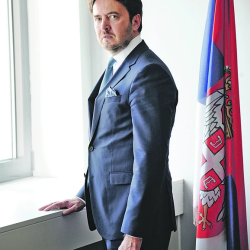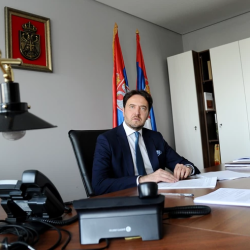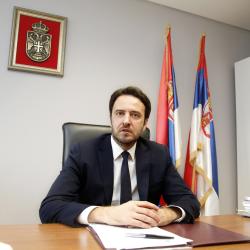INTERVIEW: Aleksandar Stepanović, President of the High Court in Belgrade: Faster access to justice, the proceedings shall be scheduled each two months, instead of twice a year
Aleksandar Stepanović, the President of the High Court in Belgrade and the Chairman of the Judicial Academy’s Steering Committee – An interview to BLIC daily – Source: BLIC
This is what Aleksandar Stepanović, the President of the High Court in Belgrade and a judge of the Supreme Court of Cassation says in an interview given to BLIC, adding that this will shorten the difference between duration of the proceedings in the interior of the country and in Belgrade.
Does this mean that a “patent” has been found to reduce the heavy workload of the High Court judges?
It has been found, namely through a preliminary solution of a well-balanced transfer of cases from the Civil Department in the second instance to the High Courts in the interior of the country. In this way, the workload of judges of the High Court in Belgrade will be significantly reduced and made more efficient, but this will also make it possible to acquire equal conditions for work and assessment as their colleagues in other parts of the country. An analysis has shown that judges of our Court in civil matters, although they make about 10% of all judges in Serbia, resolve more than one third of the total number of cases throughout the country.
Is this your own suggestion, as a member of the working group for drafting the National Strategy for Advancing the Judiciary?
Yes, it is, and it also includes implicitly an increase in the number of acting judges and other staff, an amendment of the law regarding judgement review census for initiating proceedings before a High Court, as well as raising awareness among the citizens on mediation as an alternative dispute resolution.
Does this bring an end to marathon-length proceedings at the High Court?
Although I think that that citizen discontent with the speed of pronouncing court decisions is justified, the High Court in Belgrade has an overwhelming workload in comparison to other courts of the same instance in Serbia. It has 22 times more cases than some other courts, and the judges in the Civil Department in the first instance have 1,000 cases each, on the average. This is the obstacle to scheduling proceedings more frequently than twice a year, except in cases where urgent acting is prescribed by law. It is the duty of competent institutions to resolve the overload of cases in our Court through strategic and long-term measures, which is guaranteed by the 2019-2024 National Strategy for Advancing the Judiciary.
Has justice been slow in the cases of Mišković, Ćuruvija, Šarić?
I disagree with such a statement. The end of the last year and the beginning of this year was very successful for the High Court’s Special Department for Organized Crime in Belgrade, since very complex cases with large number of the accused and abundant evidential documents have been finalized. Attempts by the defence to postpone the proceedings were also numerous. In Ćuruvija murder case, 104 witnesses were heard and 90 main hearings were held; in Mišković case there were 99, and in Šarić case 190 main hearings held. Let us not forget that the judgements in the cases of Mišković and Šarić were squashed by the Appellate Court, which did reflect upon the overall duration. In Ćuruvija murder case the finalization of the trial was dictated by a legal issue of dispute regarding legitimacy of evidence previously gathered by the public prosecutor. The High Court did finalize the proceedings within a reasonable time with due respect to human rights.
And is it a reasonable deadline in Ćuruvija murder case to issue a judgement in the first instance after 20 years, without naming the ordering party and the killer for that matter?
The critique that the proceedings in the Ćuruvija murder case took excessively long due to a fault of the Court is a paradigm shift, since the indictment was confirmed on 20 February 2015, and the judgement was pronounced on 5 April 2019. The fact that the case itself had not reached the Chamber of the Court sooner was no fault of ours.
The critique that this trial took excessively long and that this was due to a fault of the Court is a paradigm shift, since the indictment had been confirmed on 20 February 2015, and the judgement was pronounced on 5 April 2019. The court trial lasted four years, and the fact that it had not reached the Chamber of the Court sooner was no fault of ours. The public prosecutor was gathering evidence; therefore the prosecuting speed did not depend upon the Court at all. The panel of judges reached a decision within the boundaries of the indictment, and could not have decided on something that was not the subject of the indictment.
Your colleagues have claimed that in this case and in some other cases the media were exerting pressure upon the Court?
Constructive critique is welcomed, but the media have often reported tendentiously in these cases and prejudged the outcome, which compromised the confidence of the citizens in the judiciary. The media interest in Ćuruvija murder case is understandable, since he was a journalist, but it was also necessary to have due regard to the defendants’ rights who are guaranteed the presumption of innocence by the Constitution. Sweeping reporting can jeopardize the independence and impartiality of the Court, and can form a public opinion on the outcome of the proceedings, which means exerting an indirect pressure upon the work of the panel of judges. However, the judges have resisted the challenges by their own integrity and ruled in these cases guided by their free judicial discretion.
But, do judges resist statements made by politicians?
The practice of our Court has demonstrated that statements made by politicians have no influence on judges’ decisions, quite the contrary. The judgements issued did not meet the expectations either of the representatives of the executive branch or the media, because the judges ruled on the basis of examined material evidence and facts of the case.
Is it a fact of the case that there is corruption in the judiciary?
The corruption is also present in the judiciary, but at the level which is also present in other countries. I believe that our judges obey the code of ethics and the laws, and that money has no influence of judicial decisions, although there were some cases where some of our colleagues blemished their own and the reputation of all of us. These people have been convicted.
We have doubled the number of resolved cases per year
Does your re-election to the post of the head of the High Court in Belgrade and a judge of the Supreme Court of Cassation have anything to do with political influence or is it based solely on merit?
My key motive to submit my candidacy one more time was to finish the activities on advancing the operation of the Court that started in 2013, when I was elected the President of the High Court for the first time. At the beginning of my tenure, the Court used to resolve 40,000 cases per year, and after introducing long-term and systemic measures that number was increased to 80,000 at the end of 2018, with the same number of judges. I think that my re-election is solely due to such visible results which have been recognized by the High Judicial Council where professional judges form an absolute majority and who unanimously nominated me for the position.
Author: Slađana Vukašinović




